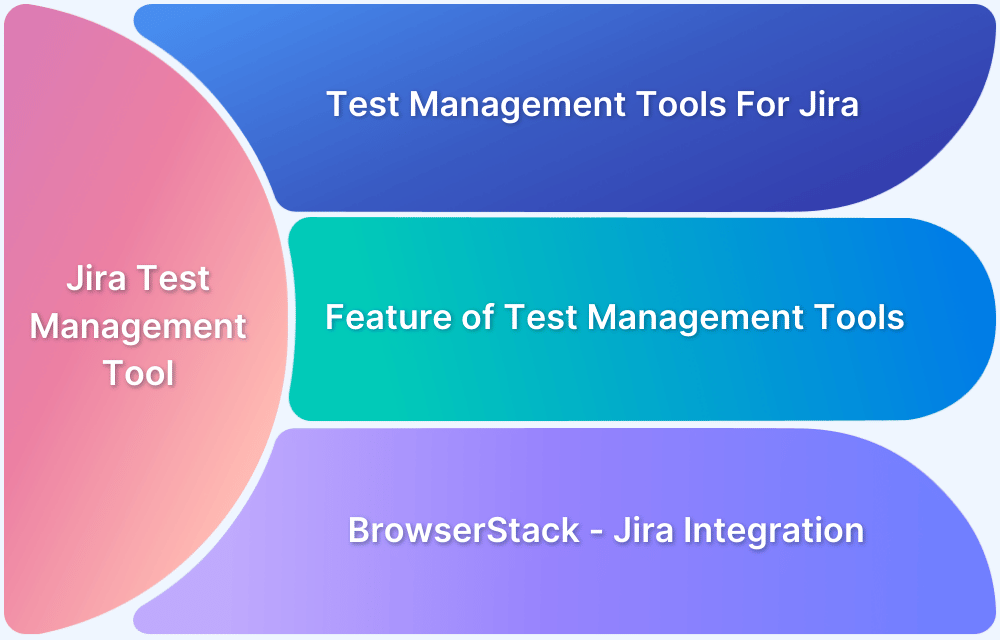As software delivery cycles accelerate in 2025, quality assurance teams need reliable platforms to manage, organize, and optimize their testing efforts. Top-rated test management tools simplify this process by centralizing test case creation, execution, and reporting in one place.
Overview
Top Rated Test Management Tools of 2025:
- BrowserStack Test Management: AI-powered unified test management platform with deep CI/CD integrations and analytics. G2 Rating: 4.5/5
- Tuskr: Scalable cloud test management focused on Agile/DevOps with advanced security and multi-project support. G2 Rating: 4.6/5
- Kualitee: Intuitive cloud solution for test and defect management well-suited for SMBs with Jira integration. G2 Rating: 4.4/5
- AccelQ: Codeless AI-driven automation and test management platform for cloud-native Agile teams. G2 Rating: 4.6/5
- Qase: Modern cloud test management tool with strong API, Jira, and Postman integrations and real-time reporting. G2 Rating: 4.7/5
- testomat.io: Agile-focused cloud test management with BDD support and automation sync for comprehensive insights. G2 Rating: 4.8/5
- TestRail: Enterprise-grade test case management with extensive reporting and automation integrations. G2 Rating: 4.4/5
- Avo Assure: Scriptless cloud automation platform integrated tightly with test management for business-critical apps. G2 Rating: 4.6/5
- PractiTest: End-to-end QA lifecycle platform emphasizing traceability and customizable dashboards. G2 Rating: 4.5/5
- TestLodge: Simple manual test management with robust defect tracker integration and easy onboarding. G2 Rating: 4.3/5
This article explores the best test management tools of 2025, their features, and how they’re transforming modern QA workflows.
What are Test Management Tools?
Test management toolsare software platforms such as BrowserStack Test Management that help QA teams plan, create, execute, and track test cases efficiently across both manual and automated workflows.
These tools provide a centralized system for managing the entire testing lifecycle, including requirement mapping, test execution, defect tracking, and reporting.
Why Use Top-Rated Test Management Tools in 2025?
In 2025, organizations are adopting top-rated test management tools to meet growing demands for speed, accuracy, and collaboration in software testing. These tools bridge the gap between manual and automated testing, providing flexibility for agile and DevOps teams.
Key reasons to use top-rated tools include:
- Centralized Management: Organize test cases, defects, and reports within a single unified platform.
- Faster Releases: Integrate with CI/CD pipelines to automate testing and accelerate delivery cycles.
- Enhanced Collaboration: Improve communication among QA, development, and product teams with real-time updates and shared dashboards.
- AI-Driven Insights: Leverage intelligent recommendations to identify redundant tests, optimize coverage, and predict high-risk areas.
- Scalability and Cloud Access: Support global teams and large projects through cloud-based scalability and anywhere access.
Key Features of Top-Rated Test Management Tools
Top-rated test management tools come equipped with powerful features that enhance testing efficiency and accuracy.
Essential features include:
- Unified Test Repository: Manage manual, automated, and regression tests from a single interface.
- Seamless Integrations: Connect with CI/CD systems, automation frameworks, and tools like Jira, GitHub, and Azure DevOps.
- Real-Time Reporting: Access customizable dashboards with insights into test performance, defects, and progress.
- AI-Powered Automation: Generate, deduplicate, and prioritize tests automatically to reduce manual effort.
- Traceability and Version Control: Link test cases to requirements and defects for end-to-end traceability.
- Customizable Workflows: Adapt processes, roles, and permissions to fit unique project needs.
- Cloud Scalability and Security: Ensure data protection, role-based access, and high availability for distributed teams.
Top-Rated Test Management Tools in 2025
In 2025, top-rated test management tools combine AI-driven automation, real-time reporting, and seamless integrations to enhance testing efficiency. These tools empower teams to streamline workflows, boost collaboration, and deliver high-quality software faster.
1. BrowserStack Test Management
A unified AI-powered platform accelerating test authoring, execution, and analytics with seamless manual and automated test management. BrowserStack Test Management integrates with popular CI/CD tools and Jira for full traceability.
Built for teams of all sizes, it ensures secure data handling while enabling high-quality, efficient software delivery.
Key Features of BrowserStack Test Management:
- AI-Powered Test Case Creation: Automatically generate comprehensive test cases from Product Requirement Documents (PRDs), user stories, or text prompts. AI also suggests enhancements to existing test cases, reducing manual effort significantly.
- Test Deduplication Agent: Detects exact or semantically similar test cases across your repository, providing intelligent recommendations for merging or removal to maintain a clean and efficient test suite.
- Low-Code Automated Test Authoring: Quickly convert manual test cases into low-code automated tests to accelerate automation adoption without requiring deep coding skills.
- Intelligent Test Selection Agent: Uses AI to identify and recommend the most relevant tests for execution, optimizing test runs and focusing on critical test coverage.
- Unified Test Management: Manage all manual and automated test cases in one centralized platform with full traceability from requirements to defects through seamless integrations with Jira, Azure DevOps, and more.
- Powerful Dashboard Analytics: Access customizable dashboards that offer real-time insights, track release status, monitor historical trends, and visualize testing metrics, including automation coverage.
- Shared Steps for Reusability: Mark repetitive test steps as shared within test cases to enhance reusability and save effort when creating or maintaining test cases.
- Quick Import & Custom Field Mapping: Import test cases rapidly from CSV files or existing management tools with automatic field mapping and on-the-fly custom field creation.
- AI-Powered Jira App with Two-Way Binding: Synchronize test cases and runs between BrowserStack Test Management and Jira, allowing management from both platforms with AI-driven assistance.
- Streamlined Manual and Automated Test Runs: Plan and execute test runs across manual and automated tests. Supports dynamic test inclusion and uploading automation results from frameworks like JUnit and BDD-JSON.
Customer Reviews:
- G2: 4.5 based on over 2,400 reviews as of October 2025.
- TrustRadius: 8.6
- Capterra: 4.6
- Buyer’s Choice Award winner, based on verified customer feedback
BrowserStack Pricing: BrowserStack offers various pricing plans customized to different user needs.
- Free Plan:Offers unlimited test cases, robust integrations, and real-time reporting capabilities.
- Team Plan: $99/month (billed annually) for 5-25 users (Includes Jira integration)
- Team Ultimate: Contact Sales (Includes AI agents and advanced analytics)
- Enterprise Add-on: Contact Sales
Try BrowserStack Test Management
2. Tuskr
Cloud-based, user-friendly test management platform that combines manual and automated testing with robust traceability and enterprise security features.
- Modern WYSIWYG editor with bulk test case editing.
- Supports up to 250K test cases; scalable multi-project management.
- Integrates with Jenkins, Playwright, GitHub, Slack, and Jira.
- Offers compliance-ready security features including SSO and audit logs.
Best for Agile and DevOps teams requiring scalable, secure test management.
G2 Rating: 4.6/5 (400+ reviews)
3. Kualitee
Intuitive cloud test management focused on fast onboarding, defect tracking, and collaboration for small to medium businesses.
- Reusable test libraries and customizable workflows.
- Integrated bug and defect tracking tied to test cases.
- Role-based access and team collaboration features.
- Integrates smoothly with Jira and Git.
Best for SMBs seeking straightforward test and defect management.
G2 Rating: 4.4/5
4. AccelQ
AI-powered codeless automation and test management platform for continuous testing of web, API, and mobile applications.
- End-to-end no-code automation covering UI and APIs.
- Cloud execution with integrated scheduling and reporting.
- Deep integrations with Jenkins, Jira, and TestRail.
- Automated test documentation and maintenance.
Best for teams looking to scale codeless automation in cloud environments.
G2 Rating: 4.6/5
5. Qase
Cloud-based test management tool that excels in rapid onboarding, API support, and integrations with Jira and Postman for functional and regression testing.
- Customizable fields with flexible permissions.
- REST API and real-time analytics dashboards.
- Support for CSV imports and audit logging.
- Enables seamless defect management and integrations.
Best for fast-growing cloud-first teams needing quick setup and flexibility.
G2 Rating: 4.7/5
6. testomat.io
Cloud-native platform with strong analytics and automated testing insights tailored for Agile and DevOps workflows.
- Automation sync with popular frameworks like Selenium and Cypress.
- BDD support and reusable test steps.
- Scalable reporting across multiple executions.
- REST API and integration-friendly architecture.
Best for Agile teams focusing on automation-driven testing insights.
G2 Rating: 4.8/5
7. TestRail
Comprehensive test management solution popular for its scalable planning, detailed reporting, and extensive integration capabilities.
- Milestone-based test planning and execution.
- Extensive dashboard options for progress tracking.
- Integrations with Jira, Azure DevOps, and test automation tools.
- Supports both manual and automated test runs.
Best for large enterprises requiring mature test management workflows.
G2 Rating: 4.4/5
8. Avo Assure
No-code, cloud-based test automation platform integrating test management for business-critical systems.
- 100% scriptless automation with scheduling features.
- Advanced test coverage analysis with AI-driven maintenance.
- Integrates with major business apps and CI/CD tools.
- End-to-end reporting with real-time dashboards.
Best for enterprises focusing on scriptless automation across business systems.
G2 Rating: 4.6/5
9. PractiTest
SaaS platform for holistic QA lifecycle management with emphasis on traceability, customizable dashboards, and integration with DevOps tools.
- Full requirements-to-defect traceability.
- Advanced reporting and filtering capabilities.
- Supports Agile, Waterfall, and hybrid models.
- API and webhook integration for extended automation.
Best for teams needing high visibility and cross-methodology support.
G2 Rating: 4.5/5
10. TestLodge
An easy-to-use manual test case management tool designed for small to mid-sized teams focused on simplicity and tight defect tracker integration.
- Guided test execution with template-based plans.
- Unlimited users at flat pricing levels.
- Two-way integrations with popular issue trackers.
- Simple, clean user interface for straightforward use.
Best for teams prioritizing manual testing simplicity and cost-effectiveness.
G2 Rating: 4.3/5
Also Read: Understanding AI Test Management
How to Choose the Right Test Management Tool
Selecting the right platform is critical. Use this checklist to evaluate your shortlisted tools:
| Criteria | Must-Have | Nice-to-Have |
| Testing Scope | Unified Manual and Automated Test Management. | Built-in Real Device/Browser cloud or tight integration. |
| Ecosystem Fit | Seamless, Two-Way Integration with Jira/Azure DevOps and your CI/CD tools. | Support for 50+ automation frameworks (Selenium, Cypress, etc.) for result ingestion. |
| Efficiency & Speed | Support for Reusable Assets (Shared Steps) and Bulk Editing. | AI-Powered features (Test Case Generation, Deduplication, Intelligent Selection). |
| Visibility | Customizable Real-Time Dashboards and full Requirements-to-Defect Traceability. | Integrated Debugging Insights and Test Observability features. |
| Scalability | Cloud-native architecture for high uptime and performance with growing test volumes. | Enterprise-grade features: Role-Based Access Control (RBAC) and Geo-Region compliance. |
Why BrowserStack Test Management Stands Out
BrowserStack Test Management combines AI, automation, and real-device execution in one powerful, scalable platform.
- AI-Powered Acceleration: Boost productivity with AI-driven test creation and deduplication for up to 90% faster authoring.
- Unified Testing & Automation: Manage manual and automated tests together with low-code automation capabilities.
- Real-World Coverage: Access 3,500+ real browsers and devices for accurate, end-to-end test execution.
- Seamless DevOps Integration: Achieve full traceability with two-way Jira sync and integrations across your CI/CD ecosystem.
Best Practices for Implementing Top-Rated Test Management Tools
To maximize the value of top-rated test management tools, teams should follow proven implementation strategies:
- Define Clear Testing Goals: Identify measurable objectives, such as improving test coverage, reducing execution time, or enhancing collaboration.
- Integrate Early with CI/CD: Connect your test management tool with existing CI/CD pipelines to automate testing and accelerate feedback loops.
- Standardize Processes: Use consistent templates for test cases, execution, and reporting to maintain uniformity across projects.
- Encourage Cross-Team Collaboration: Enable real-time communication between QA, development, and product teams through shared dashboards and updates.
- Leverage Analytics: Use built-in dashboards and reports to track test performance, identify bottlenecks, and optimize future test runs.
- Provide Training: Equip teams with proper training to ensure smooth adoption and efficient tool usage.
Conclusion
Top-rated test management tools in 2025 redefine how teams plan, execute, and track testing by combining AI, automation, and cloud scalability. They simplify collaboration, improve visibility, and drive faster, high-quality releases.
Among these, BrowserStack Test Management stands out for its AI-powered automation, real-time reporting, and seamless integration across CI/CD pipelines, making it the go-to choice for teams aiming to scale testing and deliver software with confidence.






